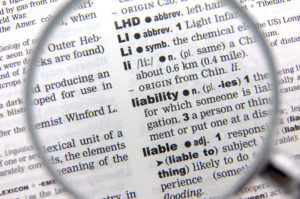
Vicarious liability occurs when one party is liable (typically for money damages) for the misconduct of another party. The injured victim does not have to prove that the defendant was at fault in any way, even indirectly. Following are some common types of cases where vicarious liability often applies.
Table of Contents
Employers

Under the ancient legal doctrine of respondeat superior (let the master answer for the acts of the servant), you can hold an employer liable for the misconduct of their employee. You don’t have to prove that the employer did anything wrong at all. All you need to prove is that:
- The party who committed the misconduct (negligence, for example) was the employee, rather than the independent contractor, of the employer;
- The employee committed a wrongful act or omission; and
- The wrongful act or omission caused you damages.
However, not everyone who works for someone else is their employee. Many commercial truckers are independent contractors concerning the trucking companies they work for. Likewise, many doctors are independent contractors for the hospitals they work at. If the wrongdoer was an independent contractor, you must find employer wrongdoing to hold the employer liable.
Parents
Parents are generally liable for the malicious or intentional misconduct of their children to the extent that it causes damages. Sometimes, even negligent misconduct will thrust liability onto the parents.
Vandalism and Theft
The victim of vandalism or theft by a child can sue the parents under Florida law. The child’s acts must be willful or intentional, and the child must live with their parents. Parents are liable for economic damages only, not non-economic damages such as pain and suffering.
Auto Accidents
When minors in Florida obtain driver’s licenses, their parents have to sign off on the license. Victims who suffered injuries due to the child’s misconduct (negligence, road rage, etc.) can sue the parents for any accidents that occurred before the child turned 18.
Unlimited Partners
When two or more parties form a general partnership, every single partner is usually liable for the wrongful acts of any of the other partners. This applies, of course, only to activities related to the business of the partnership.
In the context of a limited partnership, some partners invest money but do not participate in the day-to-day operations of the business. These partners are immune to the liability that the general partners must bear.
Product Liability Claims
Product liability occurs when someone suffers an injury from a defective and unreasonably dangerous product. There are several theories of liability that you can use to seek compensation.
Under the strict liability theory of liability, however, you can sue anyone in the product’s chain of distribution, including the manufacturer, the wholesaler, and the retailer. You don’t have to prove that any of these parties were at fault for the defect.
Automobile Owners
If you let someone use your car for some purpose of your own (to buy something for you, for example), you bear liability for any car accident damages the driver causes through their own negligence. This principle applies even if you had no reason to know of the driver’s careless driving habits.
Types of Liability That Resemble Vicarious Liability, But are Not
Liability is only vicarious when a party can be held liable completely – without direct or indirect fault. Some forms of liability look like vicarious liability but are not. Following are some examples.
Bullying
Bullying victims can hold parents liable for bullying. Strictly speaking, this does not count as vicarious liability; the parents are not liable unless they are aware of their child’s propensity for bullying.
Negligent Hiring
Suppose you hire an independent contractor trucker to haul goods for you. He drives while intoxicated, causes an accident, and injures someone. Later, it turns out that the driver had a recent DUI on their driving record that you didn’t know about. Such a lawsuit wouldn’t be based on vicarious liability but on negligent hiring.
When In Doubt, Hire a Lawyer
Certain types of vicarious liability claims, such as product liability claims, can get very complex. Others contain loopholes that the opposing party’s lawyer might exploit. Your best bet is to find a lawyer who knows all the tricks and knows how to handle them.
